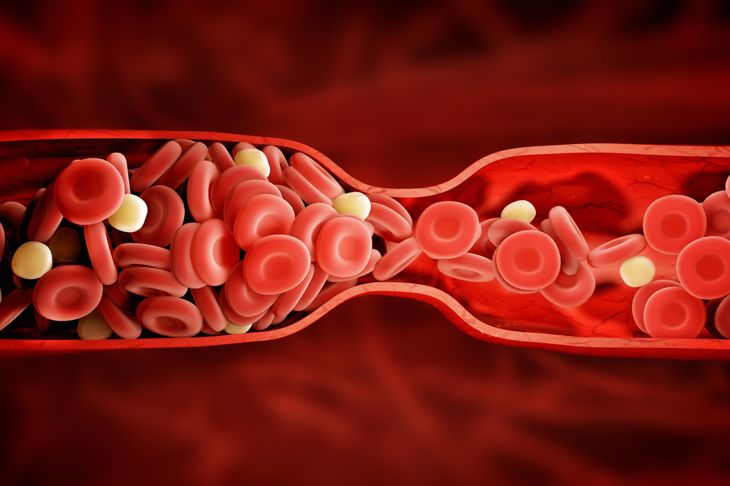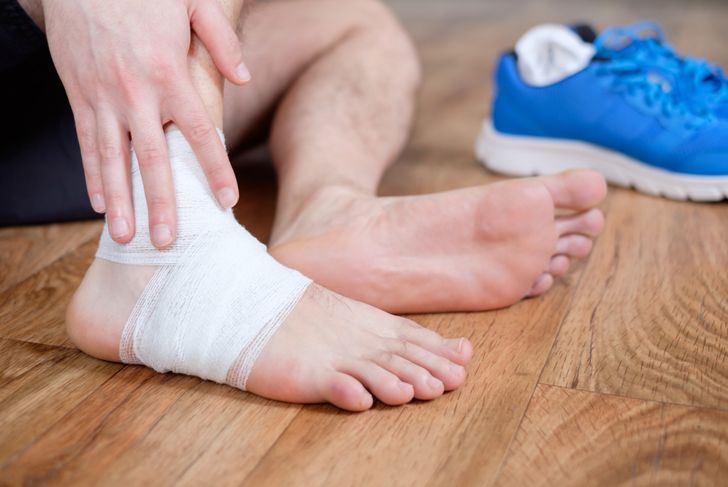Swollen ankles is a common symptom that can be caused by a wide range of factors both acute and chronic. Since it often subsides with rest or the application of heat and cold, people might be tempted to ignore it as a symptom. While sometimes this is the right call, and the fleeting issue passes in a day or two, swelling in the ankles can sometimes be an indication of a more serious or longer-lasting condition.You might notice your feet are swollen after a long day of hiking or shopping. This is a common issue caused by gravity drawing blood downward when you’ve been walking or standing for a long time. This can be confused for swollen ankles, but if resting for the evening, raising your feet above your heart, or soaking them in warm water for a while alleviates the issue, it’s likely gravity was the only cause. If you follow these methods and don’t see improvement, or if the swelling appears to be getting worse, it’s best to see a doctor and rule out any worrisome causes.
Varicose Veins
One of the leading causes of swelling in the ankles is damage to the veins in the legs that carry blood from the legs back to the heart. Veins have small flaps called valves that keep the blood moving toward the heart. Sometimes, these veins become damaged. When this happens, blood and fluid can collect in the lower leg and ankles. This leads to calf and ankle swelling, especially after sitting or standing for long periods.Wearing compression stockings and elevating the legs after you’ve been walking for some time can help relieve ankle swelling from varicose veins. If the condition becomes too uncomfortable, medical options are available, including laser treatments and ligation. Though there is a genetic factor, you can help prevent varicose veins by staying active and avoiding sitting or standing without movement for too long.
Pregnancy
Most pregnant women will experience swelling in the ankles and feet at some point during their term. There are several reasons for this. Many people assume this happens due to weight gain, but while it may be a small factor, it is not the primary cause.During pregnancy, the body retains more fluids than usual, leading to water retention. Also, as the uterus grows, it can place pressure on the veins, which in turn, slows blood flow back to the heart. This can cause swelling in the feet, ankles, and legs. Many doctors recommend pregnant women keep their feet elevated as much as possible.
Medications
Some drugs can cause the ankles to swell, though this side effect depends on the person’s propensity for this issue as well as the medication type.Common culprits include inflammatory drugs and steroids, as well as diabetes medications. Some hormone therapies such as testosterone, calcium channel blockers, and antidepressants may also cause swelling in the feet or ankles. People who experience this side effect from medication may choose to speak to their doctor about alternative treatment options. If the medication is temporary, the swelling may go away once the course is finished. If it’s an ongoing treatment, the individual may be prescribed diuretics, but no one should take additional medications without their doctor’s approval.
Blood Clots
Blood clots — blockages in the vessels that carry blood back to the heart — are another cause of swelling in the ankles. These blockages also allow fluid to leak out of the vessels, which can lead to swelling as the fluid moves into the tissues.Blood clots can have serious repercussions, so it is important to watch for any additional symptoms of this issue, such as the skin turning red or bluish and skin that is tender or warm to the touch. The legs can be affected by both superficial clots and deeper ones, called deep vein thrombosis. People who experience swelling in one leg only, especially swelling associated with pain or cramping, should see a doctor immediately to rule out a blood clot.
Injuries
Injuries to the ankle or foot often result in swelling. Sprains and fractures are the most common injuries to create ankle inflammation. Anything from a brief stumble to catching the foot in a hole and falling can cause the kind of acute injury that leads to swelling, because this symptom is the body’s attempt to start healing the injury by rushing extra blood to the area.The extent of the swelling does not always indicate the severity of the injury, however. Sometimes a simple twist can bruise and swell up like a balloon, while a severe fracture hardly swells at all. Injuries should always be examined by a doctor, especially since walking on it can worsen the situation.
Infections
Any infection or inflammation of the ankle or surrounding areas can cause swelling for a similar reason as an injury: white blood cells rush to the site of infection to help the immune system start its fight against the invador.Infections can also result in heat emanating from the inflamed area and may cause a fever. While a slightly swollen cut on the foot may not be serious enough for medical attention, if these additional symptoms develop, see a doctor immediately. Even minor infections can quickly escalate and lead to dangerous conditions like sepsis, and a doctor can prescribe medications to prevent the spread of a bacteria or virus and alleviate pain and swelling.
Lymphedema
Another possible cause of swollen ankles is lymphedema. This condition can stem from any swelling or blockage in the lymphatic system, which is part of the circulatory and immune systems. Lymphedema usually develops following the removal of one or more lymph nodes, typically when the patient has cancer. It can also occur with infection, injury, or trauma to any part of the lymphatic system.There is no cure for lymphedema, which primarily affects the legs, arms, and ankles. After confirming the diagnosis with a MRI or CT scan, or another type of imaging, the doctor can prescribe medications that reduce the risk of cellulitis, as well as exercises to move excess fluid out of the limb, compression wraps, or manual lymph drainage.
Obesity
One of the most prominent causes of swelling in the ankles is obesity, due to the additional strain excess weight places on the legs, ankles, and feet. Large amounts of body fat, particularly around the tummy, place pressure on the veins that carry blood from the legs back toward the heart. This extra pressure hinders the blood’s return to the heart. As a result, fluid builds up in the lower legs and ankles.Unfortunately, people who are obese also tend to move around less. The movement of the muscles in the lower leg helps “push” blood and fluid back to the heart. Without muscle contractions, the fluid can pool in the ankles and cause ankle swelling. This also happens when people sit too long, especially on a hot day. Ankle swelling associated with obesity is usually mild and present in both ankles.
Diseases
Many diseases present with swollen ankles and lower legs, though this is generally one of the more mild symptoms. That being said, swollen ankles can limit mobility, which may exacerbate other issues, and this makes reducing the swelling an important initiative for the medical team.Because it is such a common symptom, it’s important not to jump to conclusions of severe illness as soon as the ankles begin to swell. If the issue doesn’t pass in a few days, however, see a doctor to rule out disease. Kidney, heart, and liver disease can all cause fluid retention and fluid build-up that leads to swelling in the feet or ankles. Poor liver and kidney function can cause other symptoms such as itchy skin, dark urine, abdominal pain, and jaundice, while heart disease raises the risk of arrhythmias, heart attacks, and other serious problems.
Your Job
Depending on the type of job a person has, day-to-day work is one of the most common and significant causes of swollen ankles. People who work jobs that require them to stand or walk much of the day can experience many problems with the legs, ankles, and feet, all of which may be exacerbated by poor footwear or bad ergonomic practices. Sitting or standing for long periods causes fluid to collect in the ankles due to the effects of gravity.In addition to a safe and healthy workspace, research suggests walking around and stretching for even a few minutes every hour can help alleviate this symptom. Buying a high-quality pair of shoes that support your feet — whether that’s high arches for people with flat feet or good ankle support for those with weaker joints — can go a long way to reducing these symptoms. People who work in positions such as cashiers should always be given mats to stand on and be encouraged to perch on a stool occasionally or take frequent breaks.

 Home
Home Health
Health Diet & Nutrition
Diet & Nutrition Living Well
Living Well More
More




















